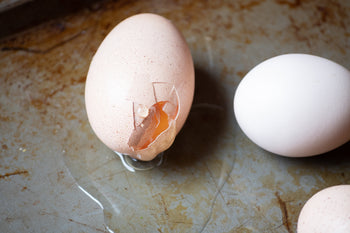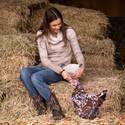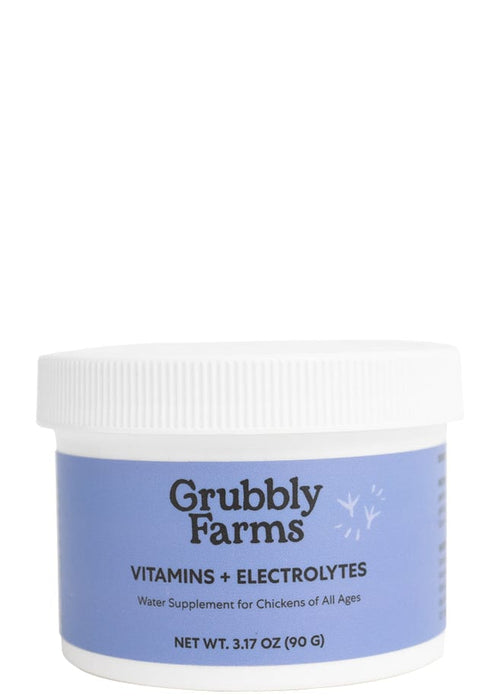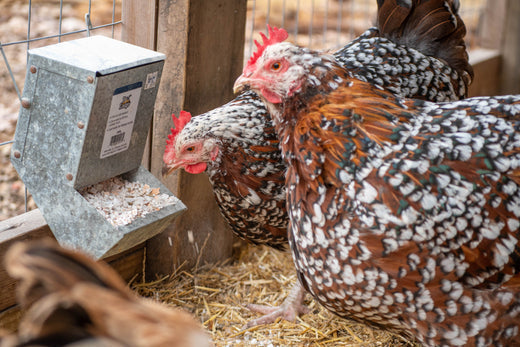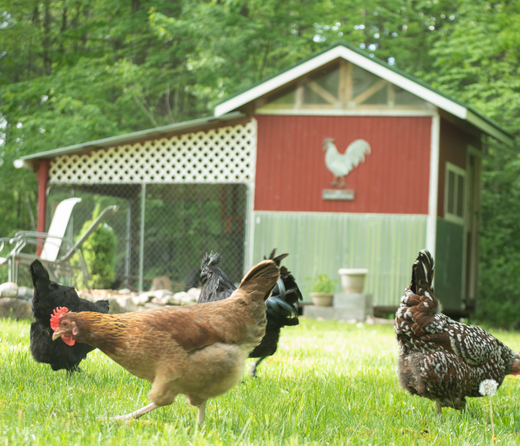While egg eating is not an incredibly common problem in backyard flocks, it can occasionally become an issue. Egg eating can lead to messy nesting boxes and less eggs for you! It can be annoying to have hens who have taken to the habit of breaking eggs to eat them. Learning how to prevent chickens from eating their eggs is the first step in avoiding egg eating issues with your entire backyard flock.
Why Do Chickens Eat Their Eggs?
Eggs are not bad for chickens. In fact, they are quite a nutritious snack that chickens love! However, an egg eating habit in your flock can get annoying and be a waste of precious fresh eggs for you. You can give your flock eggs on your terms, but the eggs they lay shouldn’t be a free-for-all buffet! Hens don’t naturally want to crack and eat the egg that they laid. So, an egg eating habit is usually caused by some external factor that can be prevented. Here are some common causes that may trigger an egg eating habit within your flock:
- Nutrient deficiency- Hens that are craving protein or need more calcium in their diet may resort to egg eating in order to meet their dietary needs. A feed that is nutritionally lacking can also lead to dietary deficiencies that can cause hens to eat their own eggs for needed nutrition.
- Boredom- Hens who are bored may turn their curiosity onto the delicious oval snacks they lay every day. Boredom can especially become a problem during the winter or when birds must be cooped up.
- Acquired taste- Once a hen acquires a taste for raw egg and associates the eggs she lays with that taste, it can lead to a bad egg eating habit that is hard to break.
Egg Eating Prevention #1: Prevent Egg-Breakage
Preventing egg breakage is the best way to make sure your hens don’t acquire a liking for raw egg. Once a hen learns that a cracked egg means a yummy snack, it is the hardest habit to break when preventing egg eating. Hens who want to eat raw eggs will stop at nothing to enjoy their favorite snack! There are several ways you can prevent eggs from breaking in the nesting box:
Remove Eggs Quickly
Eggs that pile up in the nesting box can often lead to eggs that get broken or crushed. Collecting eggs regularly throughout the day can prevent egg breakage. Generally, hens will lay their eggs in the morning. Collecting eggs in the late morning or early afternoon can be helpful in keeping the nesting boxes from becoming too full. Of course, exactly when a hen lays an egg is dictated by her laying cycle. She will lay her daily egg a little later each day, resulting in some occasional afternoon or evening layers.
The main idea is to keep eggs from piling up in the nesting boxes though, which can be done by one or two collections each day. Removing eggs from the nesting boxes throughout the day also provides less opportunity for boredom egg eating or for a hen who has become a notorious egg eater to get her daily snack.
Proper Number of Nesting Boxes
Another way to prevent egg breakage is to make sure you have the proper number of nesting boxes per laying hens in your flock. The general recommendation is one nesting box per 4-5 hens. You will quickly find out that hens have favorite nesting boxes, and they also like to share nesting boxes, or all use the same nesting box. Even though there are 4 other options, you may still find all the eggs in one nesting box! That is because hens instinctively want to lay their eggs in the same nest to create a clutch of eggs for incubating. You can try and prevent nesting box congestion by making all the nesting boxes more appealing with dark nesting box curtains and plenty of cushy nesting materials for building a nest.
Also make sure the nesting boxes are the proper size for your hens. Nesting boxes that are too small will make the hen crowded in the box and may cause eggs to be crushed. At the same time, nesting boxes that are too big will not be as appealing for hens and may encourage multiple hens to nest in the same box at the same time. The average size nesting box is 12” square.
Plenty of Litter
Speaking of nesting boxes, you can prevent egg breakage by making sure each nesting box has sufficient litter that is cushy. When a hen lays an egg, the egg drops a short distance. Cushy nesting box litter is essential to keeping that egg from breaking! On average, you want about 2 inches of nesting box litter in each nesting box. The litter should be of cushy nesting materials. Hens especially seem to like wood shavings or straw for nesting. Artificial grass mats are also a popular nesting box liner that can prevent egg breakage and are a litter that hens can’t toss out of the nesting box. However, grass mats may not be as appealing to hens, which can lead to hens laying their eggs in other locations around the coop.
Deal with Broody Hens Promptly
A broody hen is a hen who wants to sit on her eggs and hatch them. She will be persistent about remaining in the nesting box even after she has laid her daily egg. Broody hens will take up nesting box space, lead to nesting box congestion, and cause fights over nesting boxes that other hens want to use. Nesting box congestion and hen squabbles can lead to eggs being crushed and broken- the perfect opportunity for an egg-eating hen! If you have a broody hen, you will want to deal with her promptly. If you are going to let her hatch eggs, move her to a separate broody box that the other laying hens don’t have access to. If you don’t want her to hatch eggs, then you will want to move her out of the nesting box and ‘break’ her of her broodiness.
Nesting Box Training
Lastly, another way to prevent egg breakage is to make sure your laying hens are nesting box trained. Nesting box training is most important for first time flocks. Young pullets who have just been introduced to their new chicken coop will need to be encouraged to lay their eggs in the right spot (aka the nesting boxes). Placing dummy eggs in the nesting boxes can help encourage young pullets to lay their eggs in the nesting boxes. When a pullet or hen starts laying her eggs elsewhere, the eggs are more vulnerable to being broken or stepped on. Nesting box training can help prevent egg breakage and egg eating.

Egg Eating Prevention #2: Improve the Diet
Sometimes egg eating habits aren’t just caused by a hen who has acquired a taste for raw eggs. Egg eating can also result from dietary deficiencies or an incomplete diet. Preventing dietary deficiencies in your flock is essential to avoid egg eating habits in your flock. Here are some ways you can ensure your flock is getting a complete diet!
Provide Quality Feed
Chicken feed that has the correct protein and calcium content is essential for laying hens. A good quality layer feed will have all the protein and calcium needed by a laying hen on a daily basis. It should also be nutritionally complete with the other vitamins and minerals needed by laying hens. Layer feed should have at least 16% protein and 3% calcium content. Hens that get the proper amount of calcium in their diet will lay eggs with stronger eggshells to prevent egg breakage. A complete feed will also prevent the hens from wanting to eat their own eggs to satisfy a calcium or protein deficiency.
Provide Calcium Supplements
Despite the fact that a complete layer feed should provide all the calcium a laying hen requires, calcium needs do vary depending on a hen’s age, overall health, and breed. Providing a free-choice calcium supplement will allow hens to eat additional calcium as needed. Layer calcium can be supplied in a separate feeder or supplement dispenser in the hen house.
High Quality Snacks
Treating your flock is fun and rewarding! Quality protein snacks are helpful in preventing egg eating habits. Sometimes hens who are craving more protein in their diet will eat their own eggs. Black soldier fly grubs make a great healthy snack for laying hens! Not only are they a sustainable and quality source of protein, but they also provide a source of digestible calcium! The extra protein and calcium supplied by the grubs make them a healthy snack for laying hens and all flock members.
Egg Eating Prevention #3: Break the Habit
If you do end up with an egg eating hen in your flock, you will have to work hard to break that habit! Egg eating caused by dietary deficiencies can usually be fixed through an improved diet, however, that still gives the hen enough time to acquire a taste for raw egg. Here are several ways you can prevent hens from learning to love the taste of raw egg and to break any egg eating habits.
Regulate Egg Treats
Eggs are a great snack for chickens, just make sure you don’t provide any association with their egg treats and the eggs that they lay. Chickens are smart! They can learn that the oval objects they lay are the same as the treats you give them. Avoid feeding your flock raw egg or eggs in the shell. If you have some extra eggs that you want to feed to your flock, cook the eggs up as a special snack. Scrambled eggs or hard-boiled eggs that have been chopped will provide no resemblance to the eggs your hens lay.
Taste Training
For hens who do have an egg eating habit, you may need to take more drastic measures to stop the egg eating! One trick you can try is to make the hen associate her eggs with a bad taste. First you will need to blow-out an egg, which basically means you poke a small hole on either end of a raw egg and blow at one end to push the contents of the egg out the other end. Once the egg is blown out, you can fill it with a taste that would not be as palatable to a chicken. Mustard is a common filler for breaking egg-eating hens of their bad habit. Place that egg in the nesting box so that when the hen goes to sample the egg, she has a bad experience!
Dummy Eggs
Placing fake eggs in the nesting box will teach a hen that she can’t break open an egg to eat it. Using dummy eggs goes hand-in-hand with collecting the real eggs on a regular basis! You can try using golf balls to mimic eggs in the nesting boxes or you can buy fake eggs to place in the nesting boxes as a decoy. Once a hen has several unsuccessful attempts at cracking a dummy egg, she may not try pecking at the real eggs.
Roll-Away Nesting Boxes
For hens who learn to eat their eggs as soon as they lay the egg, roll-away nesting boxes may be a solution to break that bad habit. Roll-away nesting boxes are designed so that as soon as a hen lays her egg, the egg rolls away down a slanted surface into a trough that the hen can’t access. You can collect the eggs out of the trough, but the hen can’t reach the egg from within the nesting box.
Provide Entertainment
To prevent an egg eating habit from forming due to boredom, you will need to keep your flock entertained and stimulated! This is especially important during the winter months or during periods when your flock can’t get outside due to inclement weather. If your flock is used to free-ranging, then being cooped up may be especially hard for them. Straw flakes are a great boredom buster for flocks in northern regions where the winters are cold and snowy. The straw provides entertainment and insulation from the cold. Chicken toys, grazing boxes, and healthy snacks can all provide entertainment and prevent your flock from getting coop fever!
Dark Nesting Boxes
Having the nesting boxes located in a dark area of the chicken coop encourages a hen’s instinctual nesting behavior. Hens will naturally seek out dark, secluded, and protected places to lay their eggs. Dark nesting boxes will remind the hen that she is there to lay an egg, not to eat her egg! Having nesting box curtains over the nesting boxes makes the nesting boxes darker and more private.
Plenty of Space
Make sure your flock has plenty of space both inside the coop and in their enclosure. Plenty of space for each bird will keep stress levels low and boredom to a minimum, both of which will help prevent egg eating from becoming a bad habit. A standard size laying hen should have at least 2-3 square feet per bird in the chicken coop. The enclosure should provide up to 8-10 square feet per chicken and ideally should be covered so your flock can use it no matter the weather. Having plenty of space for your flock will prevent stress related behaviors and boredom egg eating.

Happy Hens = More Eggs!
Implementing these measures to prevent egg eating in your flock will go a long way both for the health and general management of your flock. Don’t lose any more eggs to hens with bad egg eating habits! Try to prevent egg eating before it happens and cure hens who have picked up the bad habit. A nutritious diet, healthy snacks, proper supplements, regular collection time, and good nesting management should help prevent egg eating in your flock.





